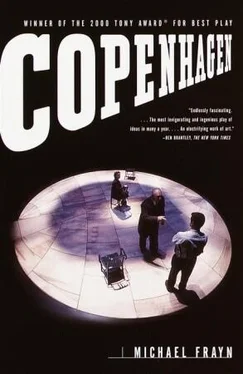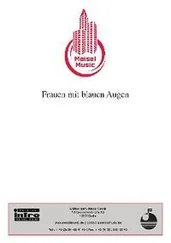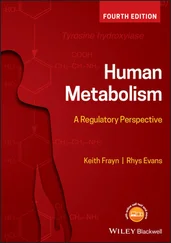The idea that Heisenberg was inviting Bohr to work on the German bomb is on the face of it the least plausible out of all the possible interpretations that have been offered. It is completely at odds with what Weisskopf recalls Bohr as saying in 1948, and with what Bohr is on record as telling Chadwick at the time. In any case, the suggestion that Heisenberg thought he might be able to import someone half-Jewish into the most secret research programme in Nazi Germany is frankly preposterous.
So what is Sereny’s evidence for her account of the meeting? At this point the sense of vertigo returns, and one begins to have the feeling that one is in an Escher drawing, where the stairs up to the floor above somehow lead back to the floor one is already on, because the only reference she gives is … Powers, Heisenberg’s great champion, in Heisenberg’s War .
And it’s true — Powers does quote an opinion to this effect (and it’s the only possible source for it anywhere, so far as I know). He says he was told by Weizsäcker that some person or persons unnamed in Copenhagen, 44 years after the event, had told him that this is what Bohr had said he had believed Heisenberg’s intention to be. One might think that this is rather faint evidence. In any case, even if it really is what Bohr believed, it is of course not what Weizsäcker believed, or Powers either. They are reporting Bohr’s alleged belief as a possible misapprehension on his part which might have explained his anger. Indeed, Powers’s own reading of the situation is precisely the one that Sereny claims to be discredited by Speer’s remark.
*
Goudsmit gradually modified his opinion, and his final judgment on Heisenberg, when he died in 1976, was a generous one which goes some way to expunging the dismissive tone of his book: ‘Heisenberg was a very great physicist, a deep thinker, a fine human being, and also a courageous person. He was one of the greatest physicists of our time, but he suffered severely under the unwarranted attacks by fanatical colleagues. In my opinion he must be considered to have been in some respects a victim of the Nazi regime.’
Robert Jungk, one of the few authors who have ever attempted to defend Heisenberg, modified his opinion in the opposite direction. In Brighter than a Thousand Suns , originally published in 1956, he suggested that the German physicists had managed to avoid building nuclear weapons for conscientious reasons, and quoted Heisenberg as saying that, ‘under a dictatorship active resistance can only be practised by those who pretend to collaborate with the regime. Anyone speaking out openly against the system thereby indubitably deprives himself of any chance of active resistance.’ But Jungk later changed his mind, and described the notion of passive resistance on the part of the German physicists as a ‘myth’. He had contributed to spreading it, he said, out of an ‘esteem for those impressive personalities which I have since realized to be out of place.’
For a really spirited and sustained defence Heisenberg had to wait until Powers published his book in 1993. It is a remarkable piece of work, journalistic in tone, but generous in its understanding and huge in its scope. A little too huge, perhaps, because Powers is unable to resist being sidetracked from the main narrative by the amazing byways that he perpetually finds opening off it. I recommend it particularly to other dramatists and screenwriters; there is material here for several more plays and films yet.
His central argument is that the Allied bomb programme succeeded because of the uninhibited eagerness of the scientists to do it, particularly of those exiles who had known Nazism at first hand, and who were desperate to pre-empt Hitler; while the German programme failed because of the underlying reluctance of scientists in Germany to arm Hitler with the bomb, however strong their patriotism, and however much they wanted to profit from the possibilities for research. ‘Zeal was needed,’ he says; ‘its absence was lethal, like a poison that leaves no trace.’
But he goes further, and argues that Heisenberg ‘did not simply withhold himself, stand aside, let the project die. He killed it.’ He tries to show that at every point Heisenberg was careful to hold out enough hope to the authorities to ensure that he and and his team were left in charge of the project, but never enough to attract the total commitment and huge investment that would have offered the only real hope of success. ‘Heisenberg’s caution saved him. He was free to do what he could to guide the German atomic research effort into a broom closet, where scientists tinkered until the war ended.’
Cassidy, reviewing the book in Nature , described it as a good story, but insisted that ‘as history it is incredible.’ Rose dismisses it as ‘entirely bogus’ and ‘a scholarly disaster’. Powers acknowledged ruefully, in a recent letter to the Times Literary Supplement , that he had failed to convince any historian who had pronounced upon the matter.
The play is not an attempt to adjudicate between these differing views of Heisenberg’s personality, or these differing accounts of his activities. But it would have been impossible to write it without taking some view of Powers’ version of events, so here, for what it is worth, is a brief summary of the case, and of my own hesitant view of it. The evidence is confused and contradictory, and making any sense of it involves balancing probabilities and possibilities almost as indeterminable as Heisenberg found events inside the atom.
*
Some of the evidence undoubtedly appears to support Powers’s thesis in its stronger form, that Heisenberg deliberately sabotaged the project.
In the first place there are two scraps of direct testimony. One is a message brought to America in 1941 by a departing German Jewish academic called Fritz Reiche. It was from Fritz Houtermans, the German physicist who had just realised that if they could get a reactor going it would produce plutonium, and that plutonium would be a fissile alternative to the U235 that they could not separate. Reiche testified later that he had passed it on to a group of scientists working at Princeton, including Wolfgang Pauli, John von Neumann, and Hans Bethe. As Rudolf Ladenburg, the physicist who arranged the meeting, recorded it afterwards, Houtermans wanted it to be known that ‘a large number of German physicists are working intensively on the problem of the uranium bomb under the direction of Heisenberg,’ and that ‘Heisenberg himself tries to delay the work as much as possible, fearing the catastrophic results of a success.’
Rose dismisses Houtermans as a proven liar, and records that Reiche later appeared to withdraw his belief in Heisenberg’s opposition to the project. But neither of these objections seems immediately relevant to the consistency of Reiche’s and Ladenburg’s testimony.
The second scrap of evidence is even more direct, but much more dubious. Heisenberg’s American editor, Ruth Nanda Anshen, records receiving a letter from him in 1970 in which he claimed that, ‘Dr Hahn, Dr von Laue and I falsified the mathematics in order to avoid the development of the atom bomb by German scientists.’
The letter itself has apparently vanished from the record. Rose nonetheless accepts it as beyond doubt genuine, and sees it as a yet more blatant attempt at self-justification. It is not, however, called into evidence by Powers, even though it would appear to support his case, and he mentions it only in his notes, and with the greatest reserve. Jeremy Bernstein, who seems to me the best-informed and most fair-minded of all Heisenberg’s critics, and whose book Hitler’s Uranium Club will be relied upon in understanding the scientific considerations that follow, dismisses it as ‘incredible’ and ‘a chimera’. It is entirely at odds with Heisenberg’s careful moderation in all his other references to the matter, and the inclusion of Hahn and von Laue in the plot is nonsensical. Hahn was a chemist, not a physicist, and, as will be plain from what comes later, had no knowledge whatosever of the relevant mathematics, while von Laue is famous as an outspoken opponent of Nazism who never worked on the German nuclear programme at all.
Читать дальше












